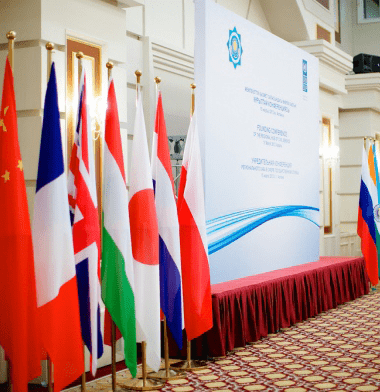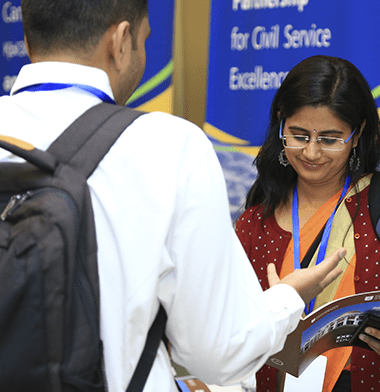ACSH supports the Government and UNDP Timor-Leste to learn best practices in the provision of public services
To support the efforts of the Government of Timor-Leste in improving the quality of public service delivery, the Astana Civil Service Hub (ACSH) jointly with the UNDP and the Ministry of State Administration of the Democratic Republic of Timor-Leste organized an international conference on: “Practices of One-Stop-Shop: Lessons for Timor-Leste”.
The event was attended by 50 representatives of government agencies, municipal institutions, as well as practitioners from Bangladesh, Brazil, Vietnam, Georgia, Kazakhstan, Malaysia, Estonia, and experts from international organizations. The participants discussed prospects of the development of public services, various technologies for their delivery, including on the principle of "One-Stop-Shop" (OSS).
Opening the conference, UNDP Resident Representative to Timor-Leste Ms. Munkhtuya Altangerel noted that “OSSs are the vehicles of facilitating access to essential public services, citizens, small, medium, business and private sector”. She also stressed that “the Government of Timor-Leste is taking a whole-of-government and whole-of-society approaches to ensure that services are consisted and prioritized, and to accelerate the advancement of the country’s development. The experiences that will be shared within the event are going to be very valuable, as we start formulating the national concept of e-Government, the provision of digitized and modern e-services, including through physical OSS facilities”.
In his welcome speech, Chairman of the Steering Committee of the ACSH Mr. Alikhan Baimenov stated that “In today's circumstances the quality of public administration and public service delivery are becoming increasingly important. As the response to the challenges, in recent decades governments around the globe have been actively advancing the application of disruptive technologies and innovations, especially in public service delivery. Оne of the ways tested by a number of countries in this direction is to build an e-government with integrated OSS that provides citizens and businesses a single access point to information and public service transactions”. He also emphasized positive characteristics of introducing OSS as the increase of citizens’ confidence in the actions of state bodies, simplification of the relationship between citizens and the government, as well as reducing the level of red tape and corruption.
Minister of State Administration of the Democratic Republic of Timor-Leste Mr. Miguel Pereira De Carvalho in his opening remarks thanked the co-organizers and participants, noting that “although countries are at different phases of OSS implementation and every model of OSS is different from others due to their peculiarities emanating from geographical, political, socio-economic, legal, and administrative factors, there are some common features such as policy and legal framework, institutional setup, coordination mechanism, delivery vehicle, etc. that are run across all the countries. Since Timor-Leste is at the early stage of this important initiative, the lessons learnt from the countries in the above areas will help us to inform our endeavors”.
The welcoming speeches were also made by the Coordinator Minister for Economic Affairs of the Democratic Republic of Timor-Leste Mr. Joaquim Amaral and the UNDP Deputy Regional Director for Asia and the Pacific, Director of the UNDP Bangkok Regional Hub Mr. Christophe Bahuet.
The speakers of the e-Conference were practitioners and experts in the field of public service delivery, they are: Senior Deputy Director, Quang Ninh Investment Promotion Agency of Vietnam Ms. Vu Thi Kim Chi, National Project Director “a2i Program” & Additional Secretary of the Ministry of Post, Telecommunication & ICT of the People's Republic of Bangladesh Dr. Md Abdul Mannan, Chief Information Officer, NC JSC State Corporation “Government for Citizens” of Kazakhstan Mr. Dauren Nuraliyev, Executive Director, Chairman of the Management Board of the e-Governance Academy of Estonia Mr. Hannes Astok, International Cooperation Coordinator of the National Confederation of Municipalities of Brazil Mr. Luís Maurício Junqueira Zanin.
In particular, Mr. Hannes Astok in his speech highlighted about the importance of understanding the processes in the transition to digital government, including OSS, where the use of innovative technologies is just a part, and most of the work is about the reengineering of public services and legal framework, change management, transformation of paper-based processes to digital, ensuring secure data exchange, and simplifying the existing databases in public service delivery through technologies and the reuse of date.
Mr. Dauren Nuraliyev presented the results of the work carried out by Kazakhstan in the transition to OSS and digital government. He noted that the infrastructure of the State Corporation, which is a single provider of public services and integrates all centers of public services in Kazakhstan, has more than 335 PSCs (OSS), 35 special PSCs that provide timely public services, as well as more than 70 mobile front-office car services for people with movement limitations, disabilities. He also stressed that almost 93% of public services were converted into electronic format within the framework of the government program "Digital Kazakhstan".
The event also touched upon the issues of ensuring the legal and institutional framework, inclusion, as well as methods of implementing public services. At the end of their presentations, the participants had the opportunity to address questions to the speakers and express their comments and opinions.



